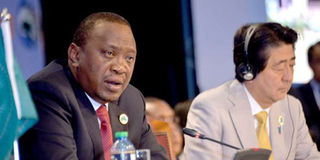African nations endorse trade partnerships to boost growth

President Uhuru Kenyatta (left) and Japan's Prime Minister Shinzo Abe hold a joint press conference at the close of the sixth Tokyo International Conference on African Development on August 28, 2016. Mr Kenyatta said, in another trade summit, boosting commodity exchange would speed up integration, develop larger markets and facilitate competition. PHOTO | SALATON NJAU | NATION MEDIA GROUP
What you need to know:
- But they added that the trend where the developed world seemed to look inwards may harm Africa’s trade.
- The Continental Free Trade Agreement was proposed by President Uhuru Kenyatta during the recent AU summit in Rwanda.
Africa’s biggest economies want one trade bloc for the continent which they say would shield it from global commodity shocks and improve living standards.
Foreign and trade ministers from Kenya, Nigeria, South Africa and Egypt issued a communique after meeting on the sidelines of the Tokyo International Conference on African Development (Ticad) held in Nairobi last week.
This came just before the Ticad summit endorsed the Nairobi Declaration, a document that announced commitment to grow trade, fight extremism and support private industries.
“We recognise the significant role of business in facilitating the continent’s development particularly in promoting fair trade, supporting entrepreneurship, promoting technology transfer and creating jobs,” the ministers declared.
But they added that the trend where the developed world seemed to look inwards may harm Africa’s trade.
The meeting involved Foreign Affairs Cabinet Secretary Amina Mohamed, South Africa’s Trade Minister Rob Davis, his Nigerian counterpart Okechukwu Enelamah and Egypt’s Assistant Minister for African Organisations Amgad Abdel Ghafffar.
The aim of the Quadrilateral Group is to bring together the continental trade blocs and allow free movement of goods.
“The immediate objective of our meeting was to exchange views on establishing a trade and economic partnership, to organise and improve on our collective efforts and to deepen and expand our quadrilateral economic relationship,” the dispatch added.
“The four countries have decided to lead the negotiations because they are the most active in trade, going by the recent history,” Mr Nelson Ndirangu, the director of Economic Affairs at the Ministry of Foreign Affairs told reporters.
PROMOTING GROWTH
The Continental Free Trade Agreement was proposed by President Uhuru Kenyatta during the recent AU summit in Rwanda.
Mr Kenyatta said boosting commodity exchange would speed up integration, develop larger markets and facilitate competition.
Several African economies like Nigeria and Angola have suffered from the recent decline in oil prices.
Despite having a market of 1.2 billion people, a huge chunk of exports and imports are with the European Union, which takes whole 63 per cent.
Most of what it sells to the outside world are agricultural raw materials, cut flowers, fish, minerals or oil.
The 2016 Africa Economic Outlook Report, for example, says despite a yearly economic growth of 8.5 per cent since 2010, trade between African countries has grown only marginally.
The report released this week notes that the intra-African trade could be stimulated by more manufactured goods moving between nations.
So far, this category of goods has accounted for two thirds of the trade within Africa.





